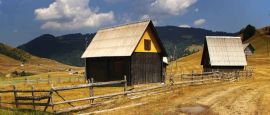Montenegro Health Care and Vaccinations
| Title | Special precautions |
|---|---|
| Diphtheria |
Sometimes |
| Hepatitis A |
Sometimes |
| Malaria |
No |
| Rabies |
Sometimes |
| Tetanus |
Yes |
| Typhoid |
No |
| Yellow Fever |
No |
Montenegro offers a public healthcare system, complemented by private clinics and hospitals in major cities. While emergency medical care is available to visitors, the quality and availability of services can vary, particularly in rural areas. Major hospitals are located in Podgorica, Kotor, and Bar, with smaller clinics throughout the country.
Pharmacies (apoteka) are widely available and usually open during regular business hours. Many pharmacists speak English, and common medications can be purchased over the counter.
In case of emergency, dial 124 for an ambulance. Emergency responders may not always speak English, so it may help to know some basic phrases or have a translation app ready.
Visitors should obtain comprehensive travel insurance before travelling to Montenegro. This should cover medical expenses, emergency repatriation, and specific activities such as adventure sports if applicable.
EU nationals carrying a European Health Insurance Card (EHIC) may receive emergency medical care at a reduced cost or for free, but this is not a substitute for travel insurance.
Tap water in Montenegro is generally safe to drink, especially in urban areas such as Podgorica, Kotor, and Budva. The water supply meets EU safety standards; many Montenegrins drink directly from the tap. While tap water is typically safe in rural areas, some travellers may prefer to drink bottled water, which is widely available and inexpensive.
Montenegro offers a high standard of food safety, and most restaurants, including konobas and restorans, adhere to hygiene regulations. Local cheeses, like Njeguški pršut and Pljevaljski sir, are safe and delicious. However, some of them are produced from raw cow's milk, so if you have a sensitive stomach, you might prefer pasteurised dairy products.
Mosquitoes can be a nuisance during the warmer months, particularly near Lake Skadar and along the Adriatic coast. While there is no risk of malaria, wearing insect repellent and using mosquito nets is advisable.
If you plan to hike in the mountains or visit rural areas, watch out for ticks, which can transmit Lyme disease. Wearing long sleeves, tucking trousers into socks, and conducting tick checks after being outdoors can help prevent bites.
Do you have any Feedback about this page?
© 2026 Columbus Travel Media Ltd. All rights reserved. No part of this site may be reproduced without our written permission, click here for information on Columbus Content Solutions.








 You know where
You know where